Related Research Articles
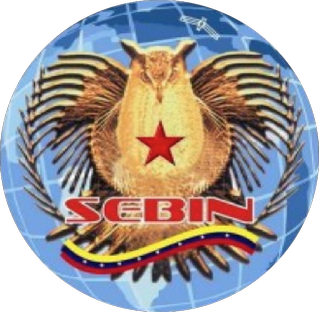
The Bolivarian National Intelligence Service is the premier intelligence agency in Venezuela. SEBIN is an internal security force subordinate to the Vice President of Venezuela since 2012 and is dependent on Vice President Delcy Rodríguez. SEBIN has been described as the political police force of the Bolivarian government.
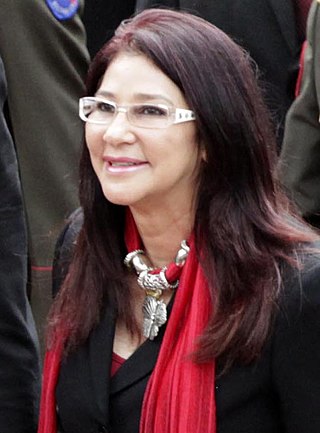
Cilia Adela Flores de Maduro is a Venezuelan lawyer and politician. She is married to the President of Venezuela Nicolás Maduro, making her the First Lady. Since 2015, she has also been a deputy in the National Assembly of Venezuela, of which she was president from 2006 to 2011, for her home state of Cojedes. In 2017, the Constituent National Assembly was founded, in which she is a member of the Presidential Commission.
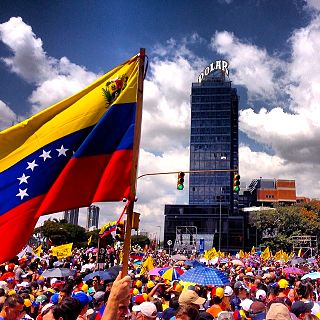
In 2014, a series of protests, political demonstrations, and civil insurrection began in Venezuela due to the country's high levels of urban violence, inflation, and chronic shortages of basic goods attributed to economic policies such as strict price controls. Mass protesting began in earnest in February following the attempted rape of a student on a university campus in San Cristóbal. Subsequent arrests and killings of student protesters spurred their expansion to neighboring cities and the involvement of opposition leaders. The year's early months were characterized by large demonstrations and violent clashes between protesters and government forces that resulted in nearly 4,000 arrests and 43 deaths, including both supporters and opponents of the government.
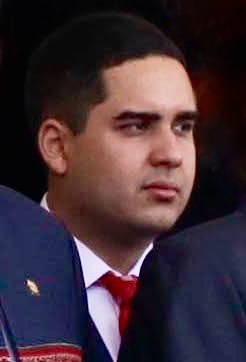
Nicolas Ernesto Maduro Guerra is a Venezuelan politician and the son of the President of Venezuela, Nicolás Maduro. He was appointed as Head of the Corps of Special Inspectors of the Presidency and Coordinator of the National Film School of Venezuela by his father. He was also elected by the PSUV party congress in 2014 to be the delegate of El Valle Capital District.

The Mother of All Marches, also known as the Mother of All Protests, was a day of protests held on April 19, 2017, in Venezuela against the Chavista government of president Nicolás Maduro. The protests began after the Supreme Tribunal of Justice dissolved the National Assembly and took over its legislative powers March 29, 2017 in what was called a self-coup. The dissolution of the National Assembly was reversed shortly thereafter on April 1, 2017.

A referendum was held in Venezuela on 16 July 2017. The referendum was called by the National Assembly in response to the constitutional crisis and President Nicolás Maduro's plans for a Constituent Assembly. The referendum was an act of civil disobedience in the context of the application of Articles 333 and 350 of the Venezuelan constitution, with the articles calling for Venezuelans to "disown any regime ... that violates democratic values", especially since the National Electoral Council and the Supreme Tribunal of Justice were not recognized in the referendum. The opposition Democratic Unity Roundtable (MUD) announced that there would be 2,030 areas for the popular consultation nationwide to serve more than 19 million voters.

2018 protests in Venezuela began in the first days of January as a result of high levels of hunger by desperate Venezuelans. Within the first two weeks of the year, hundreds of protests and looting incidents occurred throughout the country. By late-February, protests against the Venezuelan presidential elections occurred after several opposition leaders were banned from participating. Into March, the Maduro government began to crack down on military dissent, arresting dozens of high-ranking officials including former SEBIN director Miguel Rodríguez Torres.

Maikel José Moreno Pérez is a lawyer, doctor of Venezuelan constitutional law, and judge who currently serves as president of the Supreme Tribunal of Justice of Venezuela.

Tarek William Saab Halabi is a Venezuelan politician, lawyer and poet. He was a leader of the Fifth Republic Movement (MVR) party founded by Hugo Chávez, President of Venezuela, who publicly called him "The Revolution's Poet". He was the Governor of Anzoátegui from 2004 to 2012, and a member of the Committee for Justice and Truth since 2013. In December 2014, he was elected "People's Defender", or Ombudsman, by the National Assembly for 2014–2021 term. Saab was appointed as President of the Republican Moral Council of Venezuela by the People's Power in 2015. On 5 August 2017, the National Constituent Assembly appointed him as Attorney General in substitution of Luisa Ortega Diaz.

On 4 August 2018, two drones detonated explosives near Avenida Bolívar, Caracas, where Nicolás Maduro, the President of Venezuela, was addressing the Bolivarian National Guard in front of the Centro Simón Bolívar Towers and Palacio de Justicia de Caracas. The Venezuelan government claims the event was a targeted attempt to assassinate Maduro, though the cause and intention of the explosions is debated. Others have suggested the incident was a false flag operation designed by the government to justify repression of opposition in Venezuela.

Juan Requesens, a deputy of the Venezuelan National Assembly, was arrested as a suspect in the Caracas drone attack, an alleged assassination plot on the Venezuelan President Nicolás Maduro. The circumstances of his arrest and detention are controversial, and irregularities surround the legal proceedings. Requesens was imprisoned in El Helicoide from his arrest on 7 August 2018, with allegations of torture to coerce a confession, and delays impeding the legal process and hearings until his release on 28 August 2020.
There has been censorship and media control during Venezuelan presidential crisis between 2019 and January 2023.

Defections from the Bolivarian Revolution occurred under the administrations of Presidents Hugo Chávez and Nicolás Maduro. The 2019 Venezuelan presidential crisis concerning who is the legitimate President of Venezuela has been underway since 10 January 2019, when the opposition-majority National Assembly declared that incumbent Nicolás Maduro's 2018 reelection was invalid and the body declared its president, Juan Guaidó, to be acting president of the nation. Guaidó encouraged military personnel and security officials to withdraw support from Maduro, and offered an amnesty law, approved by the National Assembly, for military personnel and authorities who help to restore constitutional order.
Rafael Ramón Acosta Arévalo was a Venezuelan military officer with the rank of corvette captain of the Venezuela Navy. Acosta Arévalo was victim of forced disappearance and tortured by agents of the General Directorate of Military Counterintelligence (DGCIM) during his detention after being accused by the government of Nicolás Maduro of "conspiring to carry out an attempted coup d'état". Acosta Arévalo died as a result of injuries suffered after being tortured while in detention in the Military Hospital of the Army Dr. Vicente Salias Sanoja. The news of his death caused great impact in the media and the condemnation of both national and international authorities.
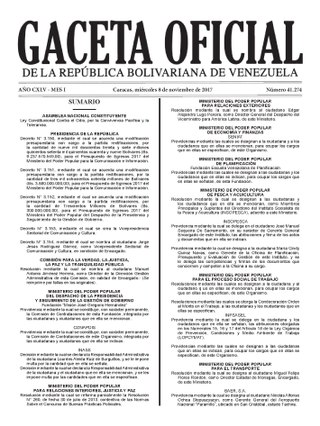
The Constitutional Law Against Hatred, for Peaceful Coexistence and Tolerance, also known simply as the Law Against Hatred, is a law passed unanimously by the Venezuelan Constituent National Assembly and published in Gaceta Oficial 41,274 on 8 November 2017.

A preliminary examination by the International Criminal Court (ICC) to analyze possible crimes against humanity committed in Venezuela is currently open. A preliminary examination was previously opened in 2006, but closed after concluding that the requirements to start an investigation had not been met. In February 2018, the ICC announced that it would open preliminary probes into alleged crimes against humanity performed by Venezuelan authorities since at least April 2017. In 2020, the Office of the Prosecutor of the ICC stated that it believed there was a "reasonable basis" to believe that "since at least April 2017, civilian authorities, members of the armed forces and pro-government individuals have committed the crimes against humanity", and on 2021 ICC Prosecutor Karim Khan announced the opening of an investigation regarding the situation in the country.

Operation Gideon was an unsuccessful attempt by the Active Coalition of the Venezuelan International Reserve, Venezuelan dissidents, and a private security firm, Jordan Goudreau's Silvercorp USA, to infiltrate Venezuela by sea and remove Nicolás Maduro from power. The plan executed from 3 to 4 May 2020 was for expatriate Venezuelan military living in Colombia to enter the country by boat at Macuto, take control of an airfield, capture Maduro and other high-level figures in his administration, and expel them from the country.

Morad El Khattouti El Horami, known mononymously as Morad, is a Spanish rapper and singer. He topped the PROMUSICAE singles charts with "Bzrp Music Sessions Vol. 47" in 2021 and with "Pelele" in 2022.

Carla María Angola Rodríguez is a Venezuelan journalist and television presenter, who worked for several years on the television program Buenas noches, of the television station Globovisión.
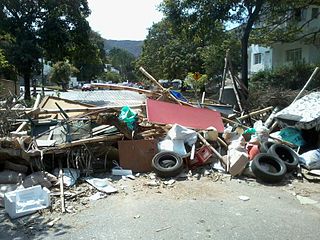
Guarimba is a term colloquially used in Venezuela for a protest method primarily used by the Venezuelan opposition that involves erecting street barricades or roadblocks. Although the erection of barricades in Venezuela dates back decades, the term has gained relevance during protests against the governments of Hugo Chávez and Nicolás Maduro. Venezuelan officials have used the term to disqualify and criminalize the opposition or opposition demonstrations.
References
- 1 2 "El régimen de Maduro ordenó la captura de una mujer que grabó un video humorístico sobre los chavistas en TikTok". infobae (in Spanish). 18 April 2022. Retrieved 2022-04-19.
- 1 2 3 "Venezuela: madre e hijo son detenidos por grabar un video humorístico en TikTok sobre Maduro". La República (in Spanish). 2022-04-18. Retrieved 2022-04-19.
- 1 2 "Ordenan captura de abuela por grabar Tik Tok contra del gobierno venezolano". El Tiempo (in Spanish). 2022-04-18. Retrieved 2022-04-19.
- ↑ "Régimen de Maduro ordenó captura de mujer que grabó TikTok de arepas con nombres de chavistas". Americatevé (in Spanish). Retrieved 2022-04-19.
- ↑ "Comparten disculpas de mujer que grabó video sobre funcionarios chavistas". El Pitazo (in Spanish). 2022-04-19. Retrieved 2022-04-19.
- ↑ "Se disculpa la adulta mayor que mencionó a funcionarios de Maduro en video viral". Runrunes (in Spanish). 2022-04-19. Retrieved 2022-04-19.
- ↑ Barrios, Oswin J. (2022-04-19). "Grabaron a Olga Mata para que ofreciera disculpas por video en TikTok". Radio Fe y Alegría Noticias (in Spanish). Retrieved 2022-04-19.